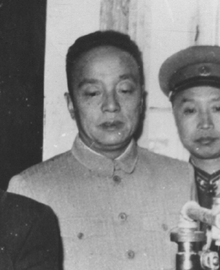

President of the People's Republic of China
3 August 1907 Tongnan, Chongqing, Sichuan, Qing Dynasty
14 September 1998(1998-09-14) (91) Beijing, People's Republic of China
9 April 1988 – 27 March 1993
Former President of the People's Republic of China In this Chinese name, the family name is Yang. Yang Shangkun杨尚昆 Yang Shangkun in 1958.4th President of the People's Republic of ChinaIn office 9 April 1988 – 27 March 1993PremierLi PengVice President Wang ZhenLeaderDeng XiaopingPreceded by Li XiannianSucceeded by Jiang ZeminSecretary-General of the CPC Central Military CommissionIn office August 1945 – November 1956Succeeded by Huang KechengIn office July 1981 – November 1989Preceded by Geng BiaoSucceeded by Yang BaibingMember of the National People's CongressIn office 21 December 1964 – 13 January 1975ConstituencyPLA At-largeIn office 25 March 1988 – 15 March 1993ConstituencySichuan At-large7th Mayor of GuangzhouIn office 1979–1981Preceded by Jiao LinyiSucceeded by Liang Lingguang Personal detailsBorn(1907-08-03 ) 3 August 1907 Tongnan, Chongqing, Sichuan, Qing DynastyDied14 September 1998(1998-09-14) (aged 91) Beijing, People's Republic of ChinaNationalityChinesePolitical partyCommunist Party of China (1926–1993)Spouse(s)Li Bozhao (m. 1929; died 1985)Children3Alma materShanghai University, Moscow Sun Yat-sen University Yang in 1940 Yang(right) with Nikolai Bulganin Yang Shangkun (3 August 1907 – 14 September 1998) was a Chinese Communist military and political leader, President of the People's Republic of China (de jure head of state) from 1988 to 1993, and one of the Eight Elders that dominated the Party after the death of Mao Zedong. Born to a prosperous land-owning family, Yang studied politics at Shanghai University and Marxist philosophy and revolutionary tactics at Moscow Sun Yat-sen University. He went on to hold high office under both Mao Zedong and later Deng Xiaoping; from 1945 to 1965 he was Director of the General Office and from 1945 to 1956 Secretary–General of the Central Military Commission (CMC). In these positions, Yang oversaw much of the day-to-day running of government and Party affairs, both political and military, amassing a great deal of bureaucratic power by controlling things like the flow of documents, the keeping of records, and the approval and allocation of funds. Purged, arrested and imprisoned during the Cultural Revolution, he spent 12 years in prison but staged a comeback in 1978, becoming a key ally of Deng, serving as Mayor of Guangzhou (1979–81), and returning to the CMC as Secretary–General and also Vice Chairman (1981–89), before assuming the Presidency. One of the earliest supporters of Chinese economic reform, Yang justified it with references to Vladimir Lenin and the New Economic Policy. However, he strongly opposed any form of political reform, and, despite his own suffering during the Cultural Revolution, actively defended the image and record of Mao. Together with his half-brother, General Yang Baibing, Yang Shangkun effectively controlled the PLA for the entire 1980s and into the early 1990s. Despite his initial hesitation, he went on to play a leading role in crushing the 1989 Tiananmen Square protests and was actually the one who planned and supervised the operations to clear the square and surrounding streets. Yang's downfall came in 1993, when he failed in his attempts to undermine the new leadership of Jiang Zemin and to retain control of the PLA, and was forced to retire by a coalition of Party elders, including Deng himself.

We use cookies
We use cookies and other tracking technologies to improve your browsing experience on our website, to show you personalized content and targeted ads, to analyze our website traffic, and to understand where our visitors are coming from. Privacy Policy.